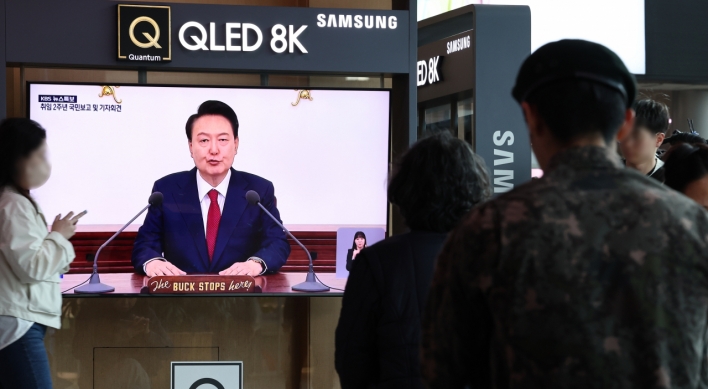TUNIS (AP) ― Tunisia extradited Libya’s former prime minister to his country on Sunday, despite concerns by Tunisia’s president and human rights groups that he could be tortured or unfairly prosecuted there.
The decision by Tunisia’s prime minister to send Al-Baghdadi Al-Mahmoudi home to face trial appeared to set up a potential clash between the president and prime minister of this North African country, the top two officials in the governing coalition.
Later Sunday, Libyan Prime Minister Abdurrahim el-Keib held a news conference in Tripoli to announce the return of Al-Mahmoudi, who had served as the last prime minister of deposed Libyan leader Moammar Gadhafi.
“Today, he was delivered by the Tunisian government, and he’s now kept in a prison managed by the Justice Ministry,” said el-Keib, adding that Al-Mahmoudi will be tried for alleged crimes against the Libyan people.
Al-Mahmoudi, 67, was arrested in September for illegally crossing the frontier into Tunisia as he tried to flee to Algeria, where Gadhafi’s family members had sought refuge. Since then Libya had been clamoring for the repatriation of Al-Mahmoudi to answer for crimes it says he committed during Gadhafi’s regime.
But officials from Libya’s former regime have not fared well in the hands of the Libyan rebels, with Gadhafi and one of his sons being executed upon capture last year.
Bechir Essid, one of Al-Mahmoudi’s lawyers, sharply criticized Sunday’s extradition. “I strongly condemn this decision which harms the dignity of Tunisia, its religion and its moral principles,” said Essid, adding that his client’s health is declining.
In January, 15 Tunisian and international human rights groups, including Amnesty International and Human Rights Watch, signed a statement opposing Al-Mahmoudi’s extradition, saying he risked death or torture if he was returned to Libya.
That concern had led to disagreement within Tunisia’s government about whether Al-Mahmoudi should be sent home.
Tunisian President Moncef Marzouki, a former human rights activist, had opposed the extradition on the ground that Al-Mahmoudi might not get a fair trial.
On Sunday Adnan Mancer, Marzouki’s spokesman,said he and his boss had not been told that the extradition would occur Sunday. “If this information is true, it will provoke a crisis among the political authorities and could have enormous consequences,” Mancer said.
But Prime Minister Hamadi Jebali was just “applying a judicial ruling” when he ordered the extradition, said Mustapha Yahyaoui, an official at Tunisia’s Justice Ministry.
After overthrowing their own dictator, Tunisians elected a ruling coalition of three parties that divided up the jobs of president, prime minister and parliament speaker. The moderate Islamist party, Ennahda, took the lion’s share of the votes and has the more powerful prime minister’s position.
Lately there has been talk of strains in the alliance.
A Tunisian fact finding commission was recently sent to Libya to see if it was possible for Al-Mahmoudi to receive a fair trial there.
The decision by Tunisia’s prime minister to send Al-Baghdadi Al-Mahmoudi home to face trial appeared to set up a potential clash between the president and prime minister of this North African country, the top two officials in the governing coalition.
Later Sunday, Libyan Prime Minister Abdurrahim el-Keib held a news conference in Tripoli to announce the return of Al-Mahmoudi, who had served as the last prime minister of deposed Libyan leader Moammar Gadhafi.
“Today, he was delivered by the Tunisian government, and he’s now kept in a prison managed by the Justice Ministry,” said el-Keib, adding that Al-Mahmoudi will be tried for alleged crimes against the Libyan people.
Al-Mahmoudi, 67, was arrested in September for illegally crossing the frontier into Tunisia as he tried to flee to Algeria, where Gadhafi’s family members had sought refuge. Since then Libya had been clamoring for the repatriation of Al-Mahmoudi to answer for crimes it says he committed during Gadhafi’s regime.
But officials from Libya’s former regime have not fared well in the hands of the Libyan rebels, with Gadhafi and one of his sons being executed upon capture last year.
Bechir Essid, one of Al-Mahmoudi’s lawyers, sharply criticized Sunday’s extradition. “I strongly condemn this decision which harms the dignity of Tunisia, its religion and its moral principles,” said Essid, adding that his client’s health is declining.
In January, 15 Tunisian and international human rights groups, including Amnesty International and Human Rights Watch, signed a statement opposing Al-Mahmoudi’s extradition, saying he risked death or torture if he was returned to Libya.
That concern had led to disagreement within Tunisia’s government about whether Al-Mahmoudi should be sent home.
Tunisian President Moncef Marzouki, a former human rights activist, had opposed the extradition on the ground that Al-Mahmoudi might not get a fair trial.
On Sunday Adnan Mancer, Marzouki’s spokesman,said he and his boss had not been told that the extradition would occur Sunday. “If this information is true, it will provoke a crisis among the political authorities and could have enormous consequences,” Mancer said.
But Prime Minister Hamadi Jebali was just “applying a judicial ruling” when he ordered the extradition, said Mustapha Yahyaoui, an official at Tunisia’s Justice Ministry.
After overthrowing their own dictator, Tunisians elected a ruling coalition of three parties that divided up the jobs of president, prime minister and parliament speaker. The moderate Islamist party, Ennahda, took the lion’s share of the votes and has the more powerful prime minister’s position.
Lately there has been talk of strains in the alliance.
A Tunisian fact finding commission was recently sent to Libya to see if it was possible for Al-Mahmoudi to receive a fair trial there.
-
Articles by Korea Herald







![[KH Explains] Can tech firms' AI alliances take on Nvidia?](http://res.heraldm.com/phpwas/restmb_idxmake.php?idx=644&simg=/content/image/2024/05/07/20240507050619_0.jpg&u=)










![[K-pop’s dilemma] Time, profit pressures work against originality](http://res.heraldm.com/phpwas/restmb_idxmake.php?idx=652&simg=/content/image/2024/05/08/20240508050705_0.jpg&u=20240508171126)
![[Today’s K-pop] NCT Dream to drop pre-release from 2nd Japan single](http://res.heraldm.com/phpwas/restmb_idxmake.php?idx=642&simg=/content/image/2024/05/08/20240508050725_0.jpg&u=)